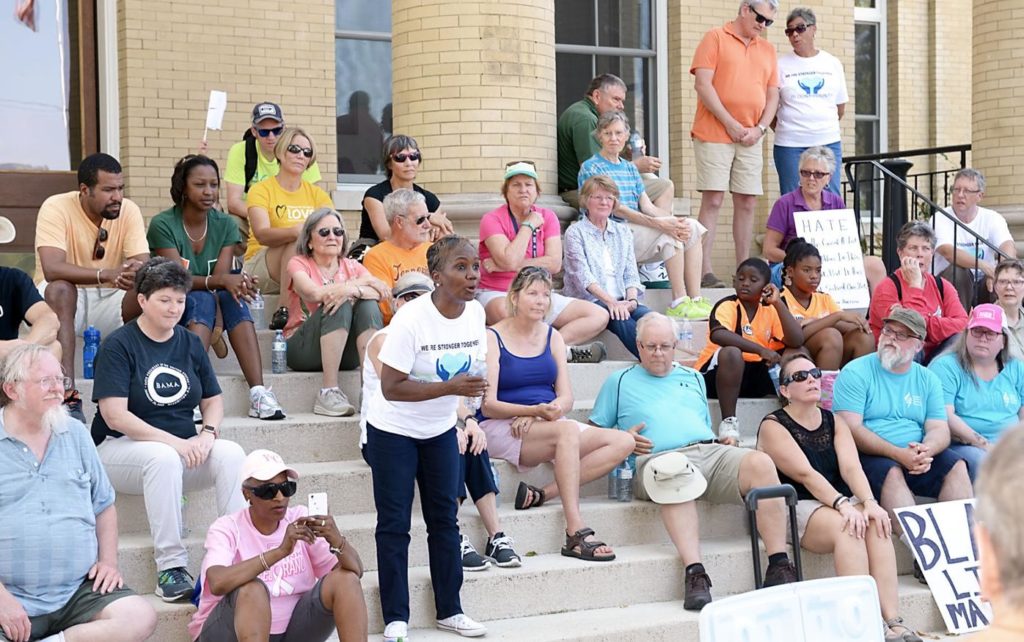Surrendering the Public Square
Even in the Bible Belt, traditional religious beliefs are being replaced by the social justice agenda, without resistance from mainline faith leaders.
This essay originally appeared in American Greatness on June 14, 2021 (here). Thanks to Power Line, Instapundit (here), Real Clear Policy (here), Tennessee Conservative News (here), The Patriot Post (here), The Tennessee Star Report (here), and Pulitzer Prize-winning cartoonist Michael Ramirez (here)! And a special thanks to Pastor Tim Richards at the Daily Journal Online (here), who credits me with an “incredibly perceptive observation.”
As I have recounted elsewhere, in 2019 my wife and I became part of the migration away from large cities to rural areas, when we moved from Austin, Texas to a small town in east Tennessee. The exodus from blue states (and from Democrat-run cities in red states) was accelerated by the Covid pandemic, as freedom-loving Americans—many of whom became liberated from commuting by remote work arrangements–sought refuge from restrictive policies, shuttered schools, and urban chaos. The confluence of Zoom, Covid-related shutdowns, and widespread domestic disturbances triggered a geographic shift benefiting low-tax, fiscally-sound states such as Florida, Texas, and Tennessee.
Last year, for the first time in its history, California lost population. People fled from many different places for a variety of reasons. Some pilgrims undertaking this journey into the heartland seek more than sensible government policies and affordable housing: they also often search for a traditional culture: patriotism, family values, respect for law and order, and old-fashioned religious faith—once-common traits increasingly hard to find in America’s woke enclaves.
The community where I live is squarely in the Bible Belt, and boasts hundreds of churches—seemingly one on every street corner. East Tennessee, settled by Scots-Irish pioneers, is overwhelmingly Christian, and Protestant. My county supports a plethora of Baptist (predominately SBC), Methodist, and Presbyterian churches, and a host of fundamentalist denominations as well as a few Catholic, Episcopal, and Lutheran churches, and even an LDS chapel–but not a single synagogue or mosque (although they may be found nearby in a larger adjoining county).
One would expect the public square in such an area to be heavily imbued with traditional Christian (if not Judeo-Christian) morality; evangelical pastors would outspokenly reinforce religiously-grounded conservative values; and on Sunday the pulpits would resound with biblical recriminations against the tide of secularism and decadence overtaking our culture. If so, one would be disappointed, and perplexed. Decades ago, Richard John Neuhaus bemoaned the prospect of the “naked public square,” in which religious influences were excluded from the conduct of public business. Neuhaus feared that the absence of religious values from the public square, which he attributed to the “abdication” of mainline Protestantism, would create a vacuum filled by secular ideologies serving the goals of the modern state.

Neuhaus was prescient. In east Tennessee, and many other places throughout the country, the public square has been abjectly surrendered. I don’t wish to suggest that east Tennesseans have become areligious; they haven’t. Most people in my community regularly attend church. Rather, the mainline churches—and especially the ministers and pastors charged with the responsibility to be “faith leaders”—have largely vacated the public square. To the extent that religious leaders espouse a public message, it is based on social justice, or trendy leftist politics, not the Scripture.
Here are a few examples: The Presbyterian-affiliated college in my town—founded as a seminary!–hosts an annual faith-based lecture series named after the school’s beloved former Bible studies professor. Last year the invited speaker devoted the lecture to promoting the teachings of Karl Marx. A prominent local Baptist minister, who serves on the college’s Board of Church Visitors, encouraged his congregation to attend. This year the lecture was a tribute to “unlikely radicals” who fomented social change, including James Lawson, a progressive cleric who was imprisoned for draft evasion, expelled from Vanderbilt University, and later in his career championed the LGBTQ agenda, abortion rights, labor unions, immigrant rights, the rights of Palestinians, and other leftist causes.
Advocacy of “social justice” in the guise of religion is not limited to college ministries. (Nor is my local college unique. Elsewhere in Tennessee, faith-based Lipscomb University recently invited Ibram Kendi, radical author of How to Be an Antiracist, to speak at its annual Christian Scholars’ Conference.) During a Sunday worship service at the height of the George Floyd rioting, another local Baptist pastor distributed a “resource list” to the congregation with links to Black Lives Matter and similar groups, and “recommended readings” that included Robin DiAngelo’s controversial book White Fragility. Conservative ministers seldom speak publicly to oppose abortion, pornography, transgender activism, or critical race theory, but one local Southern Baptist pastor actively lobbied for state approval of a methadone clinic located near a daycare center.
In a county that has voted Republican since the Civil War, and supported President Trump over Biden-Harris by a whopping 71%-27% margin, one would expect the faith leaders in the community to have a public presence commensurate with the numerical dominance that their conservative congregations collectively represent. Instead, the most visible religious figure is the Rev. Willa Estell, who is the pastor of a small congregation at St. Paul AME Zion Church. Estell casts a much larger shadow as president of the local chapter of the NAACP, in which capacity she has organized marches in support of BLM. Estell also founded and chairs a separate organization whose goals include “educating the broader community on issues of race, class and white privilege,” as well as implicit bias, systemic racism, and the racial wealth gap.

Another local faith leader, the Rev. Benjamin Lewis, leads the Bethel Missionary Baptist Church but plays an outsized role as founder and CEO of Genesis Diversity Solutions, which describes itself on Facebook as “a local diversity and inclusion consulting firm.” Claiming to have “partnerships” with local school districts, Lewis provides consulting services covering topics such as racial equity, systemic racism, unconscious biases, and “restorative practices.” At the height of the George Floyd unrest in 2020, when many American cities were literally in flames, Lewis posted “If all you can see is the riots, but not the reason, it’s because you don’t want to see.” Lewis was appointed to one of the local school district’s Diversity Task Force—the only local faith leader chosen to serve.
Nor do conservative congregations work together in the community to promote traditional values. “Progressive” faith leaders are very active in this regard. The multi-faith Blount County Ecumenical Action Council, for instance, emphasizes issues such as systemic racism, racial justice, and immigrant rights. The BCEAC has hosted speakers from the east Tennessee chapter of Interfaith Worker Justice, a pro-union organization that fights what it calls “structural racism,” “embedded racism,” and “systemic racism” in society. IWJ states that “IWJ faith leaders have been an integral part of the Sanctuary movement to protect undocumented people from detention and deportation.”
Another “community ministry,” Good Neighbors of Blount County, describes its mission as “advocating for social justice within Blount County.” It is funded “by local area churches, individuals, BCEAC, United Way and other civic groups.” Many churches assist the homeless and collect food for needy families. I do not wish to disparage any of these efforts, or minimize the importance of charity as a Christian virtue, but the agenda of many sectarian organizations veers far in the direction of leftist politics. Likewise, many important religious-based themes—traditional morality, opposing the LGBTQ agenda, protecting the rights of the unborn, abstaining from drugs, and so forth—go strangely ignored in a community brimming with mainline churches.
The most troublesome aspect of many faith leaders’ withdrawal from the public square is that it represents acquiescence to the “progressive” theological agenda, which treats CRT, social justice, “anti-racism” (as risibly defined by Ibram Kendi), same-sex marriage, and even democratic socialism as Christian imperatives, when in fact they contradict millennia of Judeo-Christian tradition. Religion, instead of being marginalized or ignored (as Neuhaus predicted in his 1984 book), has been hijacked or commandeered by progressive activists posing as faith leaders, who use their clerical robes and pulpits to dispense leftist nostrums dressed up as religious dogma. In my community and elsewhere, conservative pastors stand by silently, conceding the culture war with barely a whimper.
It is no wonder that mainline denominations are witnessing a freefall in membership and church attendance. Religious affiliation has fallen to the lowest levels in American history. Even the Southern Baptist Convention, the nation’s largest evangelical denomination, is roiled with internal controversy over wokeness. Just as Trumpian populism represented voters’ disaffection with decades of establishment Republicanism, devout Americans–(lower case) moral majoritarians, in Neuhaus’s parlance–are increasingly shifting to fundamentalist and non-denominational churches that hew to a traditional interpretation of the Bible—or staying home on Sunday. Will a courageous faith leader take up the mantle of Billy Graham and Jerry Falwell and reclaim the public square?

Real religion, with an emphasis on biblically-based Judeo-Christian morality, is essential for our experiment in republican self-government to succeed. In his 1796 Farewell Address, President George Washington counseled that “of all the dispositions and habits which lead to political prosperity, religion and morality are indispensable supports,” and warned that “morality can[not] be maintained without religion.” Our second President, John Adams, elaborated by noting that “Our Constitution was made only for a moral and religious people. It is wholly inadequate to the government of any other.” Abandoning the public square is not just a disservice to organized religion; it is a threat to the survival of a free society.
































